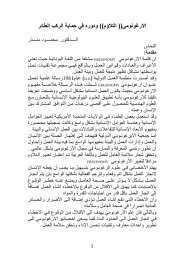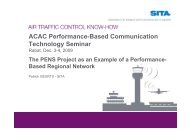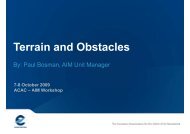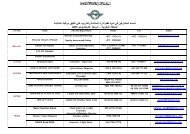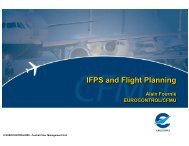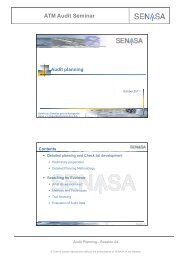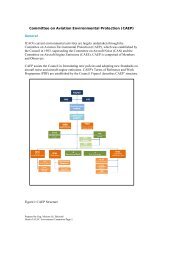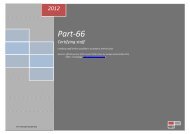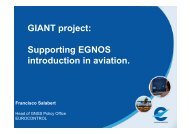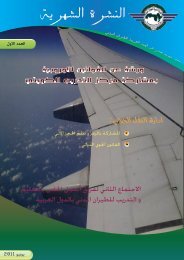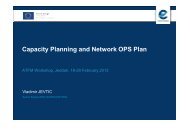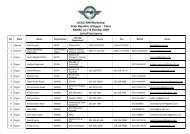Institutional and Governance aspects of ATFM
Institutional and Governance aspects of ATFM
Institutional and Governance aspects of ATFM
You also want an ePaper? Increase the reach of your titles
YUMPU automatically turns print PDFs into web optimized ePapers that Google loves.
Jean jacques Sauvage<br />
Head <strong>of</strong> External Relations<br />
<strong>Institutional</strong> <strong>and</strong> <strong>Governance</strong> <strong>aspects</strong> <strong>of</strong> <strong>ATFM</strong><br />
Jean- Jacques Sauvage<br />
Head <strong>of</strong> External Relations, EUROCONTROL<br />
Office <strong>of</strong> the Director General Amman, 14-15 October 2009
EUROCONTROL Developments<br />
1960: A common European ATC system in the upper<br />
airspace<br />
1997: EUROCONTROL Mission<br />
To harmonise <strong>and</strong> integrate Air Navigation Services in<br />
Europe, aiming at the creation <strong>of</strong> a uniform Air Traffic<br />
Management System for civil <strong>and</strong> military users, in order to<br />
achieve the safe, orderly, expeditious <strong>and</strong> economic flow <strong>of</strong><br />
traffic throughout Europe. (Article 1 <strong>of</strong> the revised Convention)<br />
Today: Building a Single European Sky
IS<br />
FI<br />
Membership <strong>of</strong> the EU,<br />
EUROCONTROL <strong>and</strong><br />
ECAC<br />
1960:<br />
Six States: UK,<br />
France, Belgium,<br />
Luxembourg,<br />
Germany,<br />
Netherl<strong>and</strong>s<br />
NO<br />
DK<br />
SE<br />
EE<br />
LV<br />
LT<br />
RU<br />
XX<br />
Eurocontrol (38 +<br />
European Community)<br />
ECAC (44)<br />
EU (27)<br />
Today:<br />
38 States<br />
IE<br />
GB<br />
NL<br />
PL<br />
BY<br />
KZ<br />
European<br />
Community<br />
PT<br />
ES<br />
FR<br />
BE<br />
LU<br />
CH<br />
DE<br />
SM<br />
IT<br />
CZ<br />
AT<br />
SI<br />
SK<br />
HU<br />
HR<br />
BA<br />
CG<br />
SR<br />
MK<br />
RO<br />
BG<br />
MD<br />
UA<br />
TR<br />
GE<br />
AM<br />
AZ<br />
IR<br />
AL<br />
GR<br />
CY<br />
SY<br />
IQ<br />
MA<br />
DZ<br />
TN<br />
MT
Remember …<br />
1980s<br />
Volume <strong>of</strong> air traffic in Europe grows<br />
steadily resulting in worsening delays<br />
• Many flights incur delays greater than ½ hour<br />
• Many disruptions in ATM<br />
• ATC does not trust the <strong>ATFM</strong> system<br />
• Lack <strong>of</strong> information to the public<br />
© EUROCONTROL2005 – Central Flow Management Unit
Why to create CFMU: Back in the 1980’s<br />
major crisis : ATM mess<br />
Creation 5 regional units<br />
Does’nt<br />
work<br />
<strong>ATFM</strong> system<br />
Londres<br />
Paris<br />
Francfort<br />
1988<br />
MATSE Decision<br />
CFMU is created.<br />
Eurocontrol will implement<br />
<strong>and</strong> operate it<br />
One central<br />
unit : CFMU<br />
+<br />
Local FMP<br />
Madrid<br />
Rome<br />
ATM<br />
Delays<br />
1996<br />
CFMU fully<br />
operational<br />
Traffic<br />
1980<br />
1990
The ECAC Ministers decided in 1980 to create the CFMU <strong>and</strong> entrusted<br />
EUROCONTROL the European Organisation for the Safety <strong>of</strong> Air Navigation to<br />
develop <strong>and</strong> operate it. CFMU became operational in 1995<br />
CFMU<br />
is part <strong>of</strong> the<br />
EUROCONTROL<br />
Agency<br />
the Executive body <strong>of</strong><br />
the<br />
EUROCONTROL<br />
Organisation<br />
CFMU/D/elo-ATCA05.ptt – 21/10/05
<strong>ATFM</strong> principles<br />
Safety first : avoid overload for controllers<br />
Principles<br />
• Safety/Capacity : no “en-route holding pattern”<br />
• Equity : “First planned at the constraint (FPL), First served”<br />
• Economy : constraint on the ground (delay, before “push back”)<br />
How ?<br />
Integrated FPL processing system<br />
To match<br />
the dem<strong>and</strong><br />
+<br />
European radar plots<br />
Dem<strong>and</strong><br />
<strong>and</strong><br />
the capacity<br />
Airspace infrastructure<br />
+<br />
Traffic h<strong>and</strong>ling capabilities<br />
Capacity<br />
BALANCING<br />
<strong>ATFM</strong><br />
To know all the European dem<strong>and</strong><br />
to match equitably with the capacity<br />
Need for a central unit : CFMU
3 main Principles <strong>and</strong> Functions<br />
To know the dem<strong>and</strong><br />
• FPL<br />
• CPR<br />
Initial Flight<br />
Planning<br />
To know the infrastructure<br />
• Airport<br />
• in the air<br />
• Capacity<br />
Env & EAD<br />
Aeronautical<br />
Information<br />
Network Information<br />
Sharing<br />
To match <strong>and</strong> manage<br />
(inside the infrastructure)<br />
the dem<strong>and</strong><br />
&<br />
the capacity<br />
Air Traffic Flow<br />
& Capacity<br />
Management
ADDITIONAL KEY FUNCTIONS<br />
Establish list alerts <strong>and</strong> EC SAFA Warnings<br />
‣The EC/EUROCONTROL SAFA/blacklist Alarming Function,<br />
has been set up in order to monitor air traffic in Europe <strong>and</strong><br />
issue relevant alarms.<br />
‣Under this system, two distinct types <strong>of</strong> alarming messages<br />
are sent out by EUROCONTROL to all (42) SAFA participating<br />
states (EU 27 + 15)
ADDITIONAL KEY FUNCTIONS<br />
Management <strong>of</strong> critical <strong>and</strong> crisis events through appropriate<br />
contingency procedures<br />
The contingency procedures shall include:<br />
‣ Organisational <strong>and</strong> co-ordination arrangements<br />
‣ <strong>ATFM</strong> measures to manage access to affected areas to prevent<br />
overloading <strong>of</strong> the whole or part <strong>of</strong> the airspace <strong>and</strong>/or airports<br />
concerned.<br />
‣ Circumstances, conditions <strong>and</strong> procedures for the application <strong>of</strong> priority<br />
rules for flights, which respect Member States’ essential security or<br />
defence policy interests.<br />
‣ Recovery arrangements<br />
‣ 11th September<br />
‣ EURO 2004 in Portugal, World Cup 2006 in Germany, UEFA football<br />
finals, air shows, Monaco Gr<strong>and</strong> Prix, Cannes festival, EURO football<br />
2008.
CFMU History<br />
‣ 1975 - 1980 Serious delays<br />
‣ 1979 Informal DGCAs meeting – 1st reference to coordinated <strong>ATFM</strong> measures<br />
‣ 1980 ICAO regional meeting developing the concept <strong>of</strong> Central Data Bank (CDB)<br />
called Data Bank EU (DBE)<br />
‣ Oct 1988 MATSE 1 Frankfurt meeting – ECAC Transport Ministers decided to create the<br />
Central Flow Management Unit (CFMU)<br />
‣ 1989 Delays nightmare – 25% flights by more than 15’<br />
‣ 4 July 1989 EUROCONTROL Commission decision to create a CFMU supported<br />
by FMPs (Flow Management positions) in each ACC, based on the<br />
ICAO centralised Traffic Management Organisation (CTMO) concept<br />
‣ May 1991 Directors Air Navigation decision to transfer overall authority for ATM measures<br />
to the CFMU<br />
‣ March 1995 Decision to create a crisis management structure (quick & collective reaction)<br />
‣ March 1996 CFMU full operational<br />
‣ March 1999 Kosovo conflict – CFMU worked with NATO <strong>and</strong> ICAO to absorb military traffic on the<br />
civil routes in the Kosovo neighbouring States
CFMU Implementation Plan (IP) - European Model<br />
1. Process in Europe<br />
‣ Development <strong>of</strong> a CFMU IP (covering operational, financial, administrative <strong>and</strong> institutional <strong>aspects</strong> <strong>of</strong> the<br />
implementation <strong>of</strong> flow management measures <strong>and</strong> agreement<br />
‣ Agreements concluded between EUROCONTROL <strong>and</strong> the participating states<br />
‣ ICAO decision that the participating States will be linked to the CEU-West<br />
2. Contents <strong>of</strong> the CFMU Project<br />
‣ ATS environment database describing ATS infrastructure <strong>and</strong> CFMU users specifications<br />
‣ Strategic database <strong>of</strong> air traffic dem<strong>and</strong> (STRAT)<br />
‣ Integrated Initial Flight Plan Processing System (IFPS)<br />
‣ Tactical database containing flight plans (TACT)<br />
‣ Archive database used for quality control statistics <strong>and</strong> <strong>ATFM</strong> planning (ARCH)<br />
‣ Tools for operating tactical data like an automatic slot allocation function (CASA)<br />
‣ Data network linking CFMU with FMPs <strong>and</strong> Aircraft Operators<br />
3. Possible process in the Arab area<br />
‣ Any similar CFMU in the region to be based on the ICAO Centralised Development Traffic Organisation (CTMO)<br />
concept<br />
‣ A central regional FMU supported by FMPs in each ACC to be foreseen<br />
‣ Air Traffic Dem<strong>and</strong> database <strong>and</strong> appropriate IT applications to support<br />
‣ FMPs to be equipped with terminals linked to CFMU<br />
‣ Aircraft Operators to be granted access to the CFMU system<br />
.
The Agency in numbers<br />
2,205 permanent staff (PS) & 106 contract<br />
staff (CS) from 38 countries<br />
• CFMU 446 (PS), 18 (CS)<br />
• CND 656 (PS), 55 (CS)<br />
• MUAC 682 (PS), 10 (CS)<br />
(270 ATCOs)<br />
• CRCO 101 (PS), 1 (CS)<br />
• HR & Finance 237 (PS), 13 (CS)<br />
• DG/Office 83 (PS), 9 (CS)<br />
7 geographical locations<br />
• Brussels, Brétigny, Luxembourg,<br />
Maastricht, Budapest, Prague,<br />
Karlsruhe<br />
Budget: 720 million Euros in 2009<br />
• 583 million Euros contributed by States<br />
Part IX : Budget 2009 CFMU <strong>and</strong> EAD<br />
• CFMU : € 110.971.073<br />
• EAD : € 14.261.200<br />
• TOTAL : € 125.232.273<br />
(Source: EUROCONTROL- DR & DF-April 2009)
EUROCONTROL - Structure<br />
MINISTERS<br />
General Assembly<br />
Performance Review<br />
Commission<br />
Civil/Military Interface<br />
St<strong>and</strong>ing Committee<br />
Civil & Military Representatives<br />
Council<br />
Safety Regulation<br />
Commission<br />
St<strong>and</strong>ing Committee<br />
on Finance<br />
Air Navigation<br />
Services Board<br />
Director General<br />
AGENCY<br />
Military ATM<br />
Board<br />
Audit Board
CFMU <strong>Governance</strong><br />
CN (Commission)<br />
‣ Transport <strong>and</strong> Defence Ministers<br />
PC (Provisional Council)<br />
‣ General Directors Civil Aviation <strong>and</strong> their military equivalents<br />
OCG (Operational Coordination Group)<br />
‣ Directors Operations<br />
CFMU Supervisory Board<br />
‣ EUROCONTROL Director General, Director CND, Director CFMU<br />
‣ 2 representatives <strong>of</strong> ANSPs (MM Riedle from DFS, Francu from Romatsa)<br />
‣ 1 representative <strong>of</strong> airspace users (Mr Wood ELFAA)<br />
‣ 1 representative from airports (Mr Salazar)<br />
‣ 1 representative from military ATM Board (Col. Logan - Chairman MAB)
Operations Coordination Group (OCG) - 1<br />
Terms <strong>of</strong> Reference<br />
Purpose<br />
‣ The Operations Coordination Group (OCG) is an advisory body to the<br />
Director General <strong>of</strong> EUROCONTROL, tasked with ensuring coordination on<br />
operational issues relating to the European ATM network.<br />
‣ The Group shall ensure that the stakeholders, acting in partnership with the<br />
Agency, participate in the definition <strong>and</strong> coordination <strong>of</strong> the deployment <strong>of</strong><br />
safe <strong>and</strong> optimised operations <strong>of</strong> the European ATM network, including the<br />
most effective use <strong>of</strong> available airspace, airports <strong>and</strong> ATC capacity.<br />
Composition<br />
‣ Since the OCG will focus mainly on operational issues, membership <strong>of</strong> the<br />
group shall be senior operational civil <strong>and</strong> military representatives designated<br />
by the EUROCONTROL Member States <strong>and</strong> high-level representatives from<br />
organisations representing civil airspace users <strong>and</strong> airports
Operations Coordination Group (OCG) - 2<br />
Terms <strong>of</strong> Reference<br />
Role<br />
The Group’s main responsibilities shall be to :<br />
‣ Plan <strong>and</strong> coordinate operational actions to address network performance gaps<br />
<strong>and</strong> to ensure commitments for their implementation <strong>and</strong> monitor the resulting<br />
overall performance <strong>of</strong> the ATM network ;<br />
‣ Plan <strong>and</strong> coordinate actions triggered by significant changes within the<br />
European Air Traffic Management system <strong>and</strong> monitor implementation ;<br />
‣ Coordinate the implementation <strong>of</strong> the EUROCONTROL ATFCM strategy,<br />
policy <strong>and</strong> principles within the framework <strong>of</strong> the dynamic management <strong>of</strong> the<br />
European ATM network ;<br />
‣ Review the CFMU work programme <strong>and</strong> related plans <strong>and</strong> expenditures,<br />
advise on the resources to be made available for ATFCM, including those for<br />
the CFMU <strong>and</strong> at local level; develop <strong>and</strong> monitor ATFCM performance<br />
indicators ; ensure that stakeholder needs are met in the development <strong>and</strong><br />
operation <strong>of</strong> the European ATFCM system ;<br />
‣ Coordinate <strong>and</strong> monitor the operation <strong>and</strong> enhancement <strong>of</strong> the European AIS<br />
Database (EAD) in consistency with the Aeronautical Information Management<br />
strategy ;<br />
‣ Advise the director General <strong>of</strong> EUROCONTROL on future network<br />
requirements from a pan-European operational perspective.
CFMU Supervisory Board<br />
Terms <strong>of</strong> Reference<br />
1. Supervisory boards for each Organisation Unit affected will provide advice <strong>and</strong><br />
assistance to the Director General <strong>and</strong> Directors in the exercise <strong>of</strong> the tasks<br />
<strong>and</strong> functions as contained in the Statute <strong>of</strong> the Agency.<br />
2. Supervisory Boards will, in particular, provide strategic advice on the<br />
implementation <strong>of</strong> the Business Plan <strong>and</strong> Budget <strong>of</strong> the Directorate <strong>and</strong> its<br />
mission <strong>and</strong> objectives <strong>and</strong> monitor the Unit’s performance against its Business<br />
Plan <strong>and</strong> Budget.<br />
3. Supervisory Boards may submit views <strong>and</strong> recommendations on all key matters<br />
affecting the relevant Organisation Unit, including policy initiatives, proposals on<br />
resources allocation <strong>and</strong> monitoring <strong>and</strong> risk management.<br />
4. Supervisory Boards, which should be limited in size, will be composed <strong>of</strong><br />
Agency Directors <strong>and</strong> the Director General in an ex <strong>of</strong>ficio capacity. They will<br />
be complemented by ‘non-executive Directors’ (i.e. Senior Managers at Director<br />
level from outside <strong>of</strong> the Agency). The non-executive Directors are expected to<br />
actively contribute in assuring balanced <strong>and</strong> risk managed views <strong>and</strong><br />
recommendations. Supervisory Boards are required to reach their conclusions<br />
by consensus.
EUROCONTROL<br />
<strong>ATFM</strong> Legal Tools<br />
<br />
<br />
ACAC Members<br />
(Algeria, Bahrain, Iraq, Jordan, Lebanon, Libya, Mauritania, Oman, Palestinian Authority,<br />
Qatar, Saudi Arabia, Tunisia, Sudan, Syria, United Arab Emirates, Egypt, Morocco,<br />
Yemen)<br />
EUROCONTROL amended Convention dated 13.12.1960 (in particular Article 2.3 (a))<br />
EUROCONTROL revised Convention dated 27.06.1997<br />
Memor<strong>and</strong>um <strong>of</strong> Cooperation between EUROCONTROL <strong>and</strong> EC dated 22.12.2003<br />
<br />
<br />
<br />
ACAC-EUROCONTROL Agreement for cooperation dated 19.09.2003 (in particular,<br />
Article1. (d), (f), (g) <strong>and</strong> Article 3)<br />
Bilateral Agreement with some ACAC Member States (Egypt, Tunisia, Morocco)<br />
Other developments in <strong>ATFM</strong>: EUROMED, ICAO/MID, EMAC
EUROCONTROL Convention<br />
Amended Convention (13.12.1960)<br />
Article 1.1<br />
(e) To co-ordinate their activities with regard to air traffic<br />
flow management by establishing an international system <strong>of</strong><br />
air traffic flow management in order to ensure the most<br />
effective utilisation <strong>of</strong> the airspace<br />
Revised Convention (27.06.1997)<br />
Article 1.1<br />
(g) To develop the available capacity to meet the air traffic<br />
dem<strong>and</strong> <strong>and</strong> to ensure its most effective utilisation through<br />
the joint establishment, operation <strong>and</strong> development <strong>of</strong> a<br />
common European air traffic flow management system, in the<br />
framework <strong>of</strong> the introduction <strong>of</strong> a uniform European air traffic<br />
management system;<br />
Justification<br />
Concerns:<br />
- The establishment <strong>of</strong> a common international air traffic flow<br />
management system aimed at ensuring the most effective<br />
utilisation <strong>of</strong> airspace based on the development <strong>of</strong> a Central<br />
Flow Management Unit (CFMU). This activity was<br />
recommended by MATSE/1 in October 1988 <strong>and</strong> agreed by<br />
the Permanent Commission at its 74th Session in November<br />
1988. The present amended Convention includes only a<br />
reference to this activity as a future potential task <strong>and</strong><br />
therefore needs to be updated.<br />
Article 2.1<br />
(k) To assist the Contracting Parties <strong>and</strong> interested nonmember<br />
States in the institution <strong>and</strong> operation <strong>of</strong> an<br />
international air traffic flow management system;<br />
Article 2.1<br />
(e) To develop <strong>and</strong> operate a common European air traffic<br />
flow management system at a common international centre in<br />
the framework <strong>of</strong> (d) above;<br />
(f) To develop, adopt, <strong>and</strong> keep under review common<br />
st<strong>and</strong>ards, specifications <strong>and</strong> practices for air traffic<br />
management systems <strong>and</strong> services;<br />
This is based on the ECAC decision, endorsed by the<br />
Permanent Commission, to create a CFMU <strong>and</strong> have it<br />
operated by EUROCONTROL <strong>and</strong> on the de-activation <strong>of</strong> the<br />
ICAO ATMG.<br />
This identifies more clearly the activities on st<strong>and</strong>ardisation<br />
which at present take place on the basis <strong>of</strong> the present Article<br />
2.1. The ECAC <strong>Institutional</strong> Strategy recommended that<br />
St<strong>and</strong>ards should be binding on States.<br />
Article 2.3<br />
The Organisation may further, at the request <strong>of</strong> one or more<br />
non-member States, be entrusted with the following tasks:<br />
(a)To assist such States in air traffic flow management <strong>and</strong><br />
in the planning <strong>and</strong> provision <strong>of</strong> air navigation services <strong>and</strong><br />
equipment;<br />
(b)To assist such States in the calculation <strong>and</strong> collection <strong>of</strong><br />
charges not covered by the Multilateral Agreement relating<br />
to Route Charges which are levied by them on users <strong>of</strong> air<br />
navigation services.<br />
The performance <strong>of</strong> such tasks shall in each case be<br />
governed by special agreements between the Organisation<br />
<strong>and</strong> the States concerned.<br />
Article 2.3<br />
The Organisation may:<br />
(a) Conclude special agreements with non Contracting<br />
Parties interested in participating in the performance <strong>of</strong> the<br />
tasks provided for in Article 2.1;<br />
(b) at the request <strong>of</strong> non-Contracting Parties or other<br />
international organisations, perform on their behalf any other<br />
tasks pursuant to this Article, on the basis <strong>of</strong> special<br />
agreements between the Organisation <strong>and</strong> the parties<br />
concerned
EUROCONTROL- EC<br />
Memor<strong>and</strong>um <strong>of</strong> Cooperation<br />
Memor<strong>and</strong>um <strong>of</strong> Cooperation (MoC) between EC <strong>and</strong> EUROCONTROL dated 22.12.2003<br />
“4. Areas <strong>of</strong> cooperation<br />
Without prejudice to other issues that may require more importance or require immediate attention <strong>and</strong><br />
action, <strong>and</strong> subject to the results <strong>of</strong> joint periodic reviews referred to in paragraph 9, the priority areas are:<br />
4.1. With regard to the implementation <strong>of</strong> the Single European Sky <strong>and</strong>, in particular with a view to the<br />
development <strong>of</strong> relevant implementing rules,<br />
‣ safety <strong>and</strong> security,<br />
‣ human resources ad ATC training,<br />
‣ provision <strong>of</strong> air navigation services, including access to data, accounting principles, air navigation<br />
charges schemes <strong>and</strong> performance regime,<br />
‣ provision <strong>of</strong> air navigation services, including access to data, accounting principles, air navigation<br />
charges schemes <strong>and</strong> performance regime,<br />
‣ provision, common management <strong>and</strong> publication <strong>of</strong> aeronautical information,<br />
‣ airspace, architecture <strong>and</strong> management, in particular European Upper Flight Information Region<br />
(EUIR), functional airspace Blocks (FABs) <strong>and</strong> airspace classification,<br />
‣ civil/military coordination,<br />
‣ flow <strong>and</strong> capacity coordination,<br />
‣ systems <strong>and</strong> equipment <strong>and</strong> their interoperability including communication (COM), surveillance<br />
(SUR) <strong>and</strong> navigation (NAV) systems,
Cooperation in the Mediterranean Area<br />
EUROMED<br />
‣ Algeria, Egypt, Israel, Jordan, Lebanon, Morocco, Palestinian Authority, Syria, Tunisia, Turkey<br />
AEFMP<br />
‣ Algeria, Spain, France, Morocco, Portugal<br />
BLUEMED<br />
‣ Cyprus, Greece, Italy,Malta<br />
EMAC<br />
‣ Cyprus, Egypt, Jordan, Lebanon, Syria<br />
ACAC<br />
‣ Algeria, Bahrain, Iraq, Jordan, Lebanon, Libya, Mauritania, Oman, Palestinian Authority, Qatar, Saudi<br />
Arabia, Tunisia, Sudan, Syria, United Arab Emirates, Egypt, Morocco, Yemen<br />
Bilateral Cooperation with EUROCONTROL- CFMU<br />
‣ Algeria, Egypt, Israel, Lebanon, Tunisia as adjacent States to the CFMU area<br />
‣ Morocco <strong>and</strong> Turkey, Members <strong>of</strong> the CFMU area
Integration <strong>of</strong> non-EUROCONTROL States in CFMU<br />
<strong>and</strong> EAD (ACAC area)<br />
On the basis <strong>of</strong> a Bilateral Agreement <strong>and</strong> paid by the relevant States according to the charging principles<br />
agreed by the Member States<br />
Morocco<br />
Algeria<br />
Tunisia<br />
Libya<br />
Egypt<br />
Israel<br />
Syria<br />
Jordan<br />
Lebanon<br />
Bahrain<br />
ATFCM<br />
CFMU State. MoC under signature<br />
Adjacent state.<br />
No request so far<br />
Adjacent State. Request for integration. Draft MoC<br />
No relationship<br />
Potential adjacent State. To be discussed via ACAC<br />
Adjacent State. Official request in December 2008<br />
Adjacent state<br />
No request so far<br />
CFMU proposal via EUROMED in December 2008 proposing to Syria<br />
to become an adjacent State but no reply<br />
CFMU proposal via EUROMED but no reply<br />
Adjacent State but no request<br />
Request. CFMU staff missions via ACAC in May 2009<br />
EAD<br />
Connection planned in 2010<br />
Letter sent to EUROMED coordinator<br />
No reply so far<br />
Request for integration. Draft MoC<br />
No relationship<br />
Potential adjacent State.<br />
To be discussed via ACAC<br />
Connection planned in 2009. EAD Staff<br />
missions financed by EUROMED to that effect<br />
Adjacent state<br />
EAD letter sent to EUROMED coordinator but no<br />
reply<br />
Official request in December 2008.<br />
EAD to coordinate with EUROMED<br />
Request in October 2008. EAD staff missions<br />
financed by EUROMED to that effect<br />
Request sent by EAD to EUROMED coordinator<br />
but no reply<br />
Request for information
Charging Policy principles applicable for the integration <strong>of</strong> non-<br />
EUROCONTROL States in support to States24<br />
Support to States<br />
Integration to CFMU/EAD<br />
Level<br />
Strategic<br />
Member States <strong>and</strong> ECAC<br />
States with Bilateral<br />
Agreements<br />
Free<br />
ECAC States without<br />
Bilateral Agreements<br />
NON-ECAC States<br />
Integration to CFMU/EAD<br />
NON ECAC States<br />
Tactical<br />
Technical<br />
<strong>and</strong><br />
Operational<br />
a. Staff costs without taxes<br />
;<br />
b. 5 % administrative<br />
overhead on staff costs<br />
<strong>and</strong> all other expenses<br />
a. Staff costs with taxes;<br />
b. 5 % administrative<br />
overhead on staff costs<br />
<strong>and</strong> all other expenses<br />
a. Staff costs with taxes ;<br />
b. 15 % administrative<br />
overhead on staff costs <strong>and</strong><br />
all other expenses<br />
a. 15 % administrative<br />
overhead on staff costs <strong>and</strong><br />
all other expenses<br />
b.Staff costs with taxes ;<br />
a. Staff costs with taxes ;<br />
b. 20 % administrative<br />
overhead on staff costs<br />
<strong>and</strong> all other expenses<br />
a. Staff costs with taxes ;<br />
b. 20 % administrative<br />
overhead on staff costs<br />
<strong>and</strong> all other expenses<br />
a. EUROCONTROL<br />
budget <strong>and</strong> contribution<br />
key : PNB (30 %), ATC<br />
(70 %) <strong>of</strong> the non ECAC<br />
State.<br />
CFMU/EAD Budget <strong>and</strong><br />
contribution key.<br />
b. 12 % administrative<br />
overhead costs.
Thank you.<br />
------------<br />
Questions ?



